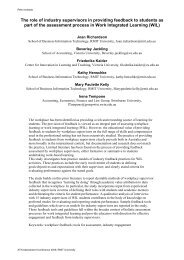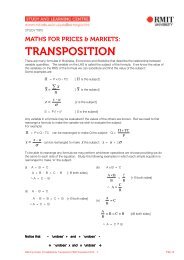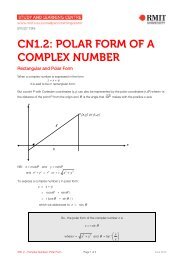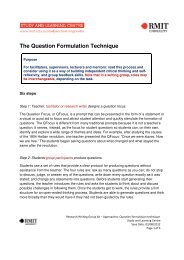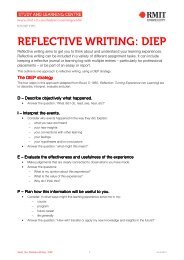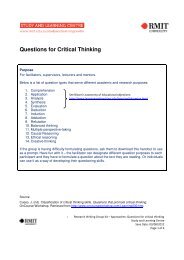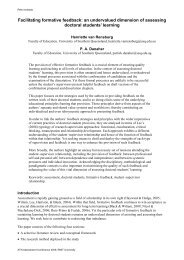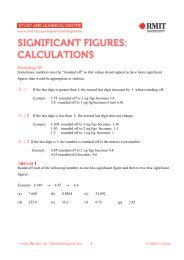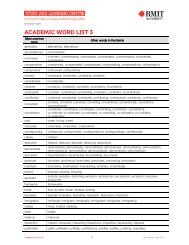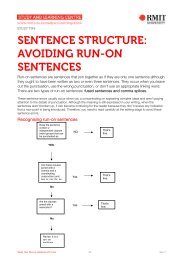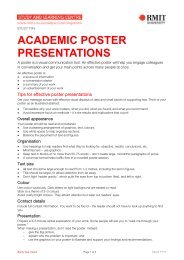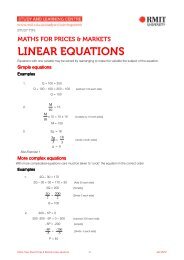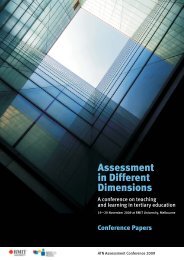student feedback and leadership - Office for Learning and Teaching
student feedback and leadership - Office for Learning and Teaching
student feedback and leadership - Office for Learning and Teaching
Create successful ePaper yourself
Turn your PDF publications into a flip-book with our unique Google optimized e-Paper software.
Student Feedback & Leadership<br />
Using this technology, <strong>student</strong>s received immediate <strong>feedback</strong> as to whether<br />
they understood the concept <strong>and</strong> how they per<strong>for</strong>med relative to the class.<br />
In addition, the lecturer was able to see how well the concept had been<br />
understood by the class <strong>and</strong> then either spend more time on the concept<br />
or proceed to the next part of the lecture. Approximately five questions were<br />
presented in a two hour lecture. To create enthusiasm <strong>for</strong> this initiative <strong>and</strong><br />
to encourage <strong>and</strong> reward <strong>student</strong> participation, prizes were r<strong>and</strong>omly awarded<br />
during each lecture by drawing names from a list of participants from the<br />
previous week’s class. Prizes such as movie tickets, bags of lollies <strong>and</strong><br />
Krispy Kreme doughnut vouchers were awarded each week during the trial.<br />
This initiative was supported with a <strong>Learning</strong> <strong>and</strong> <strong>Teaching</strong> Investment<br />
Fund (LTIF) grant from RMIT.<br />
Second Semester 2008:<br />
As a consequence of the <strong>feedback</strong> from Semester 1, 2008 regarding the<br />
cost concerns <strong>and</strong> uncertainty relating to the use of mobile phones, the<br />
textbook publishers developed an alternative method based on the Votopedia<br />
technology developed by CSIRO which would be cost neutral to the <strong>student</strong>s.<br />
This new technology was trialled in Semester 2. As this technology was in the<br />
developmental stage, it was only tested in the relatively smaller evening class<br />
comprised of mature age <strong>student</strong>s. This cohort of <strong>student</strong>s was more receptive<br />
to new technologies according to the Coordinator’s experience in trialling this<br />
technology in Semester 1.<br />
The second technology that was applied in the course in Semester 2 was<br />
podcasting. The podcasts consisted of a commentary on the lecture of the<br />
week <strong>and</strong> <strong>student</strong> work. The objective was to highlight key points arising from<br />
(1) the topic of the week, (2) <strong>student</strong> questions (elicited in classes <strong>and</strong> through<br />
the online Distributed <strong>Learning</strong> System (DLS), <strong>and</strong> (3) the Coordinator’s<br />
observations of <strong>student</strong>s’ work in progress including <strong>student</strong> per<strong>for</strong>mance<br />
on quizzes <strong>and</strong> debates. The aim of the podcasts was to provide additional<br />
<strong>feedback</strong> to <strong>student</strong>s in a <strong>for</strong>m they can readily access <strong>and</strong> assimilate.<br />
The podcasts are delivered through the DLS using multiple technologies.<br />
ECON1030 – Business Statistics<br />
It should be noted that the majority of undergraduate programs offered<br />
by the Business College do not require maths as a pre-requisite. Based<br />
on <strong>student</strong> <strong>feedback</strong> relating to difficulties with course material due to a nonmaths<br />
background, as well as <strong>student</strong> <strong>feedback</strong> on the GTS items relating<br />
to <strong>feedback</strong>, action was taken to address these concerns. In addition, many<br />
of the criticisms of large classes by <strong>student</strong>s relate to the lack of interaction<br />
with teaching staff (Carbone <strong>and</strong> Greenberg, 1998) <strong>and</strong> their impersonal nature<br />
(Cooper <strong>and</strong> Robinson, 2000). “Large classes often set up a distance between<br />
instructors <strong>and</strong> <strong>student</strong>s” (Cooper <strong>and</strong> Robinson, 2000, p.9) The Course<br />
Coordinator sought to trial a solution to this concern commencing initially<br />
in Semester 2, 2007 <strong>and</strong> continuing in first Semester 2008.<br />
Page 96



